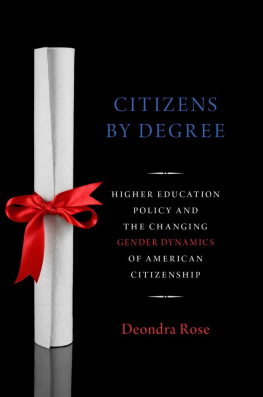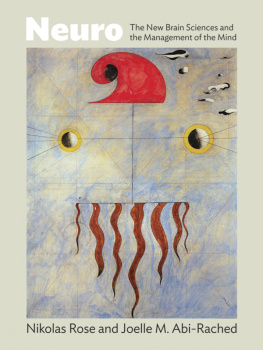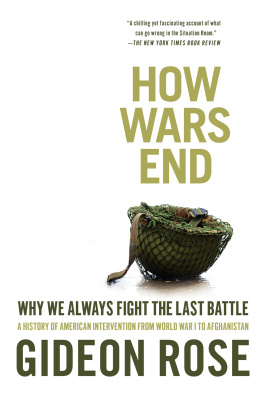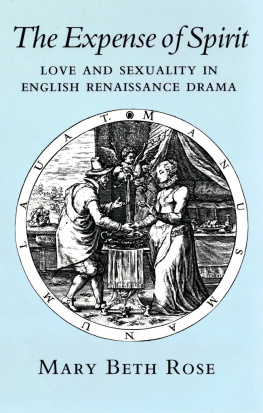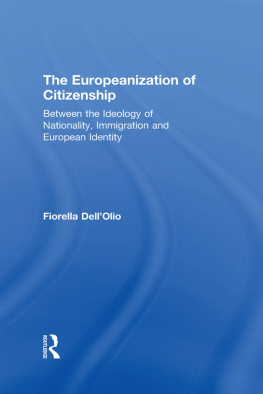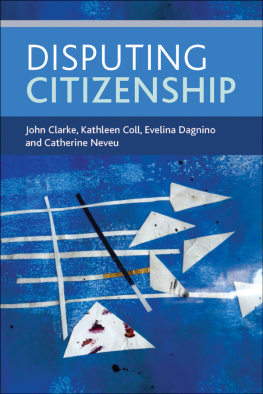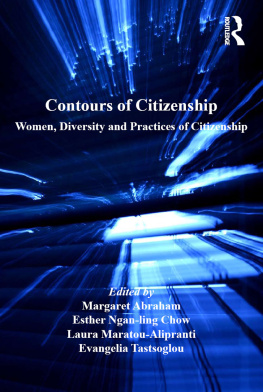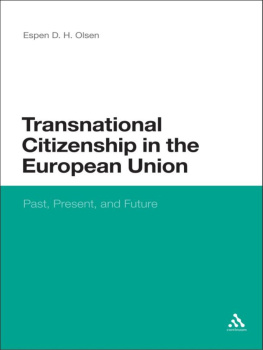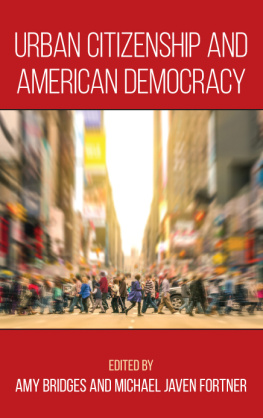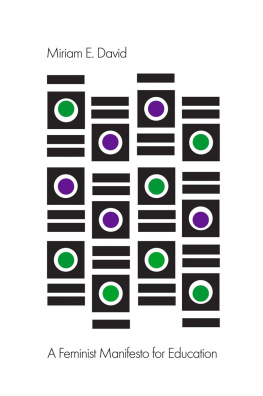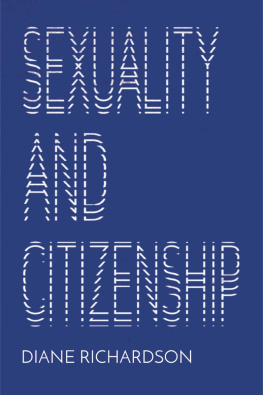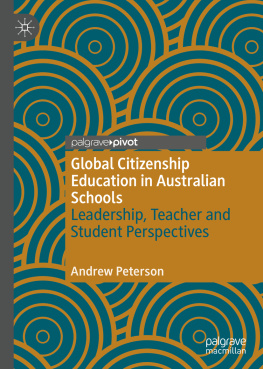Citizens by Degree
Studies in Postwar American Political Development

Oxford University Press is a department of the University of Oxford. It furthers the Universitys objective of excellence in research, scholarship, and education by publishing worldwide. Oxford is a registered trade mark of Oxford University Press in the UK and certain other countries.
Published in the United States of America by Oxford University Press 198 Madison Avenue, New York, NY 10016, United States of America.
Oxford University Press 2018
All rights reserved. No part of this publication may be reproduced, stored in a retrieval system, or transmitted, in any form or by any means, without the prior permission in writing of Oxford University Press, or as expressly permitted by law, by license, or under terms agreed with the appropriate reproduction rights organization. Inquiries concerning reproduction outside the scope of the above should be sent to the Rights Department, Oxford University Press, at the address above.
You must not circulate this work in any other form and you must impose this same condition on any acquirer.
Catalogue record is available from the Library of Congress.
ISBN 9780190650957 (pbk.)
ISBN 9780190650940 (hbk.)
ISBN 9780190650971 (epub.)
For my mother, Donna Elaine Rose.
Remember the ladies.
Abigail Adams, 1776
CONTENTS
Writing this book has been one of my lifes most thrilling endeavors, and I would like to express sincere thanks to the many people whose support helped me bring the project to completion. I am most grateful to the policymakers, activists, former legislative staff members, and other experts who shared their knowledge about the National Defense Act, the Higher Education Act, and Title IX with me. My sincere thanks go to the Honorable Senator Birch Bayh, Dr. Bernice Sandler, Dr. Mary Allen Jolley, Ms. Margaret Dunkle, Mr. Richard Green, Dr. Donna Nelson, Ms. Marilyn Stapleton, Ms. Val Bonnette, and Dr. Wendy Mink. I am especially grateful to Dr. Mary Allen Jolley for sharing Rep. Carl Elliotts archived papers with me. Thanks also go to Mrs. Helen Nycz, Mr. David Drennen, Dr. Elizabeth Sanders, Mrs. Millie Rowe-Sanders, and Mrs. Shirley Williams Lynch for the inspiring biographical narratives that help to bring the history to life. The US Department of Education allowed me to use restricted-access data from the National Postsecondary Student Aid Study, the US Library of Congress provided access to archived congressional papers, and the Oregon Historical Society provided me with access to Rep. Edith Greens archived papers.
My journey as a political scientist, political historian, and policy feedback scholar has been profoundly shaped by Suzanne Mettlers extraordinary mentorship. In addition to being a world-class intellectual and a trailblazer among political scientists, Suzanne offers a model of excellence in scholarship that I strive to emulate. I am eternally grateful to Suzanne for her generous feedback on this project at every stage of its development and for permitting me to use the Social and Governmental Issues and Participation (SGIP) dataset for this research. I am grateful to Theodore J. Lowi for unwavering faith in this project and for serving as an unrivaled inspiration. His recent passing was a tremendous loss, and Im sad that I wont be able to show him the final product. But his characteristic enthusiasm, insightful feedback, and rousing pep talks were integral to its existence. I am also extremely grateful to Michael Jones-Correa for brilliant insights and generous feedback that have greatly benefited this book. Michaels wisdom, generosity, and unstinted support have played a central role in my development as a scholar, and I will forever appreciate his mentorship. Christopher J. Anderson offered valuable questions, insights, and advice that have made a tremendous difference to my work, and this project in particular. This book also benefited from Peter Ennss generous feedback and thoughtful suggestions. Finally, I am grateful to Elizabeth Sanders, whose wisdom, infinite kindness, vast intellect, and friendship have made valuable contributions to my development as a scholar and to this project.
Cornell Universitys Government Department, the University of Notre Dames Political Science Department, and the Sanford School of Public Policy at Duke University provided vibrant intellectual communities that sustained and inspired me as I wrote. Many thanks go to the Cornell Institute for Social and Economic Research (CISER) and to Dr. Warren Brown, Pam Baxter, Kim Burlingame, and Lynn Martin for all of their help in securing and housing my restricted-access data. I also offer sincere thanks to Aurora DAmico at the National Center for Education Statistics (NCES), Tracy and Dan at NCES, Francoise Vermeylen and Shamil Sadigov at the Cornell Statistical Consulting Unit (CSCU), Tyler Ransom at the Duke Social Science Research Institute, and the incredible reference librarians at Cornells Olin Libraryespecially Lynn Thitchener, Maureen Morris, and Peter Campbell. I am very grateful to my excellent team of undergraduate research assistants at Duke UniversityKathryn Eckhart, Blaine Elias, Hilary Greenberg, Sophie Haet, Sophia Mamilli, Lexi Mendes, and Martina Tikuand for generous funding from the Eads Fellowship, which made it possible to engage them.
At Cornell, I benefited from a tremendous community of people. In addition to the scholars mentioned previously, I am grateful to Richard Bensel, Ronald Herring, and Tina Slater. I offer a high salute to the dear friends who have gone the distance with me: Phillip Ayoub, Chris Zepeda-Milln, Jaimie Bleck, Idrissa Sidibe, Maria Sperandei, Sreedevi Muppirisetty, Leila Ibrahim, Igor Logvinenko, Don Leonard, Sophia Jordan Wallace, Julie Ajinkya, Benjamin Brake, Pablo Yanguas, Berk Esen, Janice Gallagher, Tariq Thachil, Simon Gilhooley, Pinar Kemerli, Noelle Brigden, Lucia Seybert, Simon Cotton, and Desmond Jagmohan. And I dont know what I would have done without the support of Marin Clarkberg, Kris Corda, Kat Empson, J. Ellen Gainor, Cindy Grey, Christine Holmes, Barb Knuth, Sheri Notaro, Laurel Southard, and Brenda Wickes.
The two years that I spent as a Moreau Postdoctoral Fellow at the University of Notre Dame were crucial to the continued development of this project. I am especially grateful to Dianne Pinderhughes and Christina Wolbrecht for their generous mentorship during my time there. I am also grateful to Ruth Abbey, Peri Arnold, Jaimie Bleck, Eileen Hunt Botting, David Campbell, Darren Davis, Michael Desch, Amitava Dutt, Karen Graubert, Alexandra Guisinger, Victoria Tin-bor Hui, Joshua Kaplan, Geoffrey Layman, David Nickerson, Paul Ocobok, Richard Pierce, Emilia Powell, Benjamin Radcliff, Ricardo Ramirez, Naunihal Singh, Ernesto Verdaja, and Dana Villa for valued friendship and colleagueship.
The Sanford School of Public Policy has provided an extraordinary place for bringing the book to completion. It is a privilege to work at an institution that prioritizes service in the leadership of society and that values the role that government programs can play in fostering equal opportunity. Words fall short of conveying my deep gratitude to the brilliant Kristin Goss, who read the entire manuscript and offered insightful feedback that significantly strengthened it. Many thanks also go to Elizabeth Ananat, Charles Clotfelter, and Robert Garlick whose generous feedback helped me tremendously. Furthermore, I offer heartfelt thanks to Catherine Admay, Susan Alexander, David Arrington, Carolyn Barnes, Sarah Bermeo, Tony Brown, Kelly Brownell, Nick Carnes, Kerri Carnes, Phil Cook, Sandy Darity, Lynette Edgerton, Christina Gibson-Davis, Elise Goldwasser, Heather Griswold, Kerry Haynie, Carol Jackson, Ashley Jardina, Bruce Jentleson, Belinda Keith, Judith Kelley, Karen Kemp, Bob Korstad, Anirudh Krishna, Helen Sunny Ladd, Pam Ladd, Cassie Lewis, Mary Lindsley, Joel Luther, Linda Lytvinenko, Frederick Fritz Mayer, Paula McClain, Manoj Mohanan, Candice Odgers, Jackie Ogburn, Jenni Owen, Stan Paskoff, Jay Pearson, Gunther Peck, Dirk Philipsen, Billy Pizer, Marcos Rangel, Ken Rogerson, Seth Sanders, Steve Schewel, Steve Sexton, Quinton (Q) Smith, Jessi Streib, Don Taylor, Peter Ubel, Kate Walker, Anna White, Kate Whetten, and Sarah Zoubek. I also want to say a big thank you to Lisa Garcia-Bedolla for her valuable mentorship, which has served as a guiding light as I have brought this project to completion.

